I’m still in Leon, and we have 25000 evacuated people here. roofs blown off, etc.
I was actually here in my room, preparing the conference of a political party in Norway. The storm was pretty bad, but suddenly the lights went out, and about 10 mins later some of the other living here knocked on the door, advising me to get out an into the kitchen, as a giant Mango-tree looked like it might fall and smash my room.
So I stood in the kitchen for a while (a few hours). The kitchen is halfway outdoors, and so I secured the door leading out with a refrigerator. When the wind started dying down, I walked out and around town. That surely wasn’t very safe, but I needed food. Most trees on the way had fallen, and so had a lot of the electrical installation. In addition, the streets were flooded, and people were running everywhere quite frantically.
Monthly Archives: May 2008
Who is really progressive in Northern Ireland? (3/3)
I recently went to Northern Ireland, to the city of Belfast. The Left has generally supported those pro-catholics, who are working for a united Ireland as a part of a national liberation struggle from London rule. I decided to interview representatives of progressive parties on either side on the issues that socialists should really care about — social issues — to see how different they really are in their day-to-day politics in these current times of peace. This is the last of three parts, in which I conclude after having interviewed Hugh Smyth from the Progressive Unionist Party (PUP) and Paul Maskey from the socialist Irish-republican Sinn Feinn party.
So there we go. I interviewed a representative of a progressive party on either side of the divide, and their answers were remarkably similar.
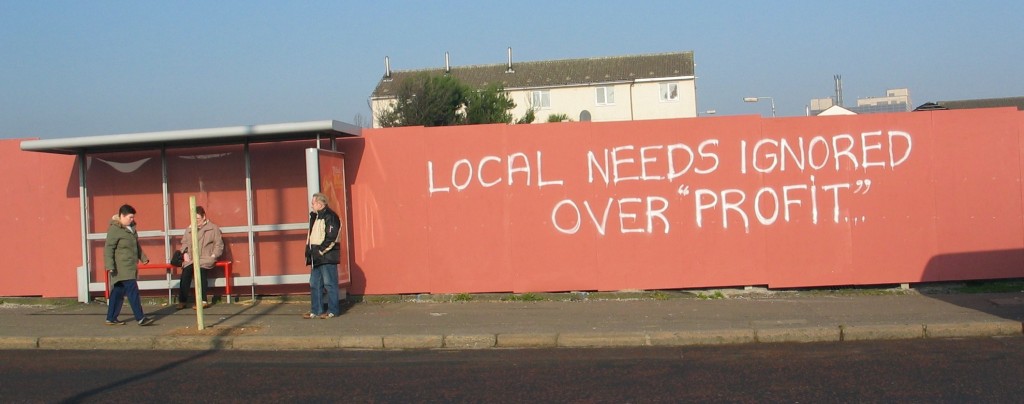
Let us review their answers once more:
PM: Paul Maskey (Sinn Fein)
HS: Hugh Smyth (HS)
housing:
HS: not opposed to rich apartments, but percentage needs to be affordable
PM: not against private houses, but more social housing
Continue reading Who is really progressive in Northern Ireland? (3/3)
Who is really progressive in Northern Ireland? (2/3)
I recently went to Northern Ireland, to the city of Belfast. The Left has generally supported those pro-Catholics, who are working for a united Ireland as a part of a national liberation struggle from London rule. I decided to interview representatives of progressive parties on either side on the issues that socialists should really care about — social issues — to see how different they really are in their day-to-day politics in these current times of peace. This is the second of three parts, me interviewing Paul Maskey, member of the Northern Irish Assembly for Sinn Fein, in his office in Western Belfast. Part three with the conclusion will follow tomorrow.
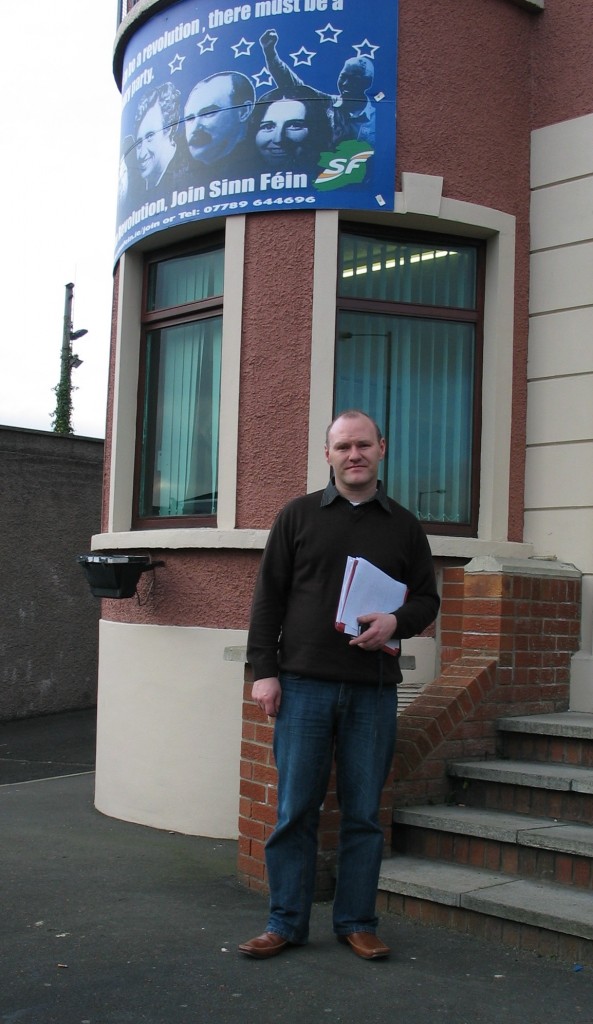
Continue reading Who is really progressive in Northern Ireland? (2/3)
Who is really progressive in Northern Ireland? (1/3)
I recently went to Northern Ireland, to the city of Belfast. The Left has generally supported those pro-catholics, who are working for a united Ireland as a part of a national liberation struggle from London rule. I decided to interview representatives of progressive parties on either side on the issues that socialists should really care about — social issues — to see how different they really are in their day-to-day politics in these current times of peace. This is the first of three parts, me interviewing Hugh Smyth, founder and former leader of the Progressive Unionist Party (PUP) and current member of the Belfast City Council, representing his small, but locally very present party, in his office in the Shankill Road in Western Belfast. Parts two and three will follow tomorrow and the day after
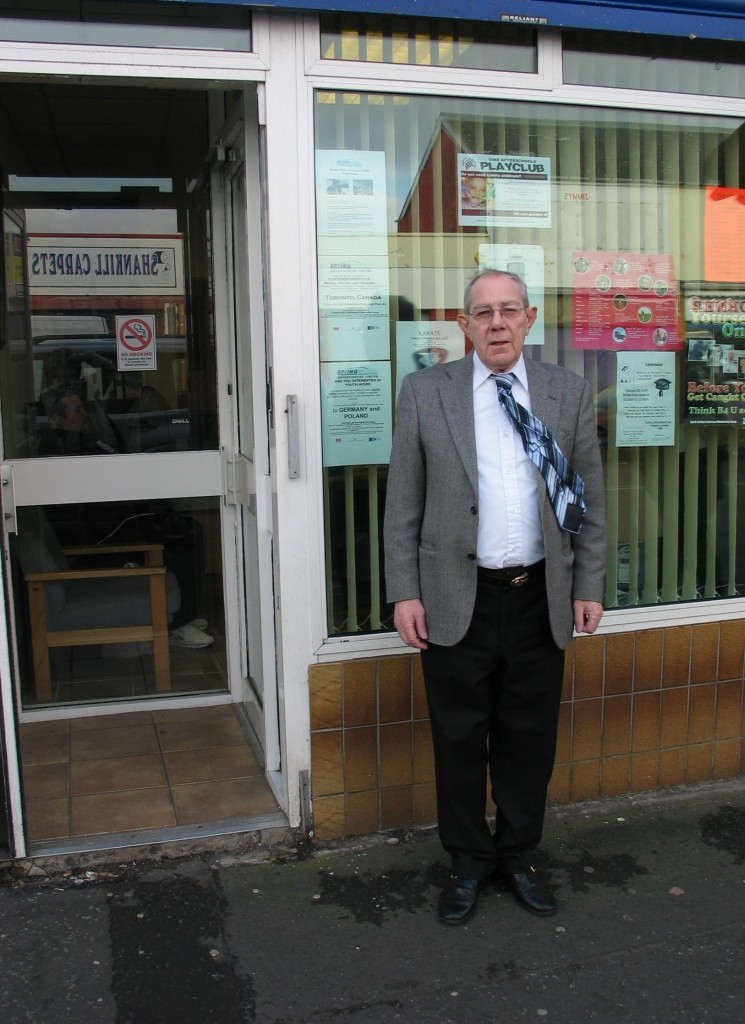
JW: Ok, here we go…
HS: Who.. what are you enquiring?
JW: I’m trying to look at what kind of policies you have. And what you don’t support and so on. Given current issues that you have in this country. I can read all the questions up first if you want me to.
HS: No, just we’ll go through them. I need to do it fairly quickly, cause I’m…
JW: Well the first one is about gentrification. I saw when I walked up here there were lots of signs… ehm.. what people asking for apart… like not to build more apartment buildings and that there was a lack of public housing. What’s your response to that?
HS: Well, that is true. I mean, the Shankill road is a typical working class area.
It used to be that we had what was known as high-rise blocks of flats. And these were built by the housing executive. And we fough for years to get them demolished and the feeling being that we needed housing, not massive big tower blocks of flats. And it seems to be that that’s over 25 years ago, that the whole circle… it’s done a complete circle now. And now that these luxury apartments are coming back. Whilst we welcome investment in the area, the thing being that the people in this area can’t afford them. They’re way beyond the price range of the people here.
And so the local people’s needs needs to be met. So what we are saying: we’re not opposed to a certain amount of apartments. But we want the sites that they build, split up, and that there should be a percentage of that would become affordable housing.
That’s the way we’re looking at that.

JW: What about the public funding for roads and parks and so on. Is that an issue for you here?
HS: Not at the moment. We’ve just switching over… got our new assembly back in. And… It has been an issue. I mean in the past we believe that the British government didn’t put enough finance into roads and parks and various different things. But we now feel that we have for the first time ever an opportunity of our own politicians being able to seek and hopefully have sufficient funds to completely rehabilitate the whole of Northern Ireland. Now it’s not going to happen overnight. It’s going to take time. But I believe that we are now taking the first step towards achieving what we want to be… where we want to be.
JW: What about industry? And I’m thinking Harland & Wolf, Shorts, Mackies, Like there has been has been some problems in keeping industrial jobs up here.
HS: Yeah, we lost thousands upon thousands of jobs. I mean Mackies is no more. There is no James Mackies; it’s gone. Harland & Wolf is surviving, you know, on a couple of hundred people where it used to employ 30,000. The aircraft factory is still there, Bombardier, that’s probably one of the most modern and best aircraft factories in the whole of western Europe, if not the world. And it’s continuing to give employment.
But whilst we lost jobs in the field of… of… eh… that type of a field, there’s other jobs have been created. And at this given time, we’re enjoying the lowest unemployment figures that we have had for over fifty years. So whilst we lost jobs, because of the peace and the investment that has been put in the computerized type jobs…
The whole market has changed. From engineering type bit works, because that’s… that’s the facts across the whole of Europe. But with the modern technology that we now have. We’re enjoying to be the lowest unemployment figures ever.
JW: So I take it that you don’t see any need for action currently?
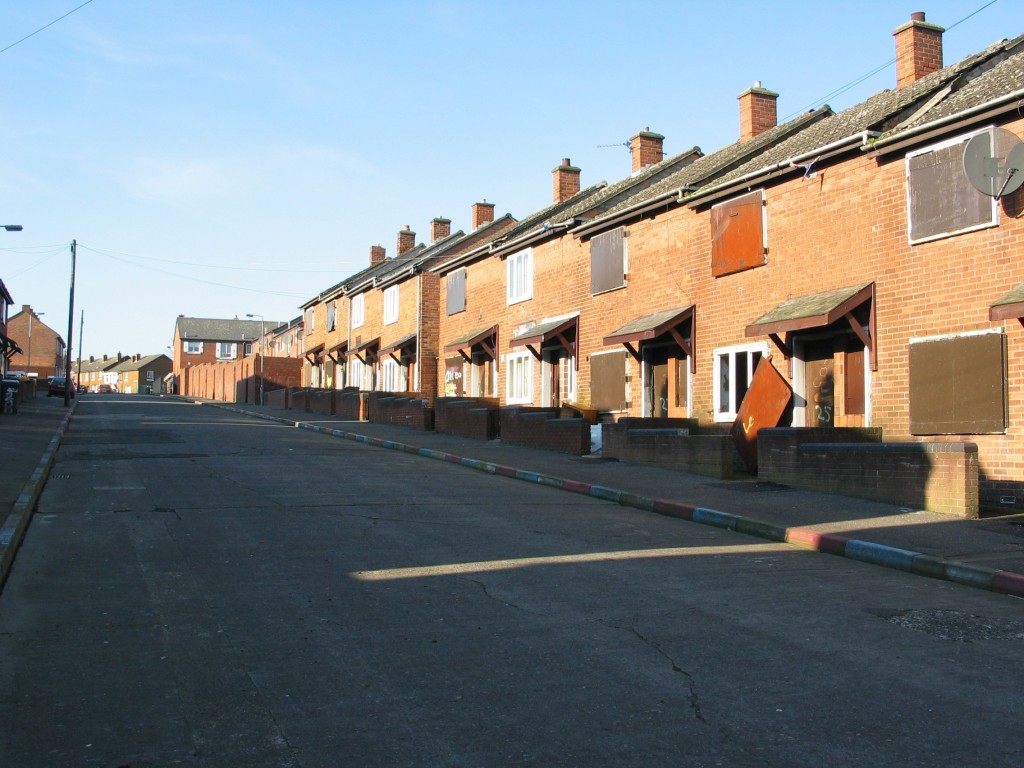
HS: Oh yes, we do. You know, I’m not saying that we should sit back. I believe that there needs to be more apprenticeships signments. My biggest fears is that we have many skills in Northern Ireland. And my fear is that we’re gonna lose those skills. Even the shipbuilding skilled and the engineering skilled. So I think the government need to take on a program where there is more apprenticeships, I mean even the skills that people don’t recognize… I mean, because of the big changes that’s taking off here in Northern Ireland, a lot of the jobs that are being created are in the building trade. I mean you would have brick layers, you would have plasterers, carpenters, electricians. Now, at the moment we’re having difficulty… I know for a fact that companies are having difficulties recruiting people. Because, those were trades that people shied away from. But now they realize that those are highly paid financial jobs. But what we need to do is to get the government to open up a training program where people can actually go in and… where people can be trained up as brick layers and as plasterers, as carpenters. And they do it for the first couple of years, cause firms can’t afford to take them on.
But if the government opened up a training center, where the first two years would work to qualify them for their apprenticeship and then they can be farmed out to these companies and finish their trades there. I think it’s very important that we do that.
JW: Very interesting. What about the NHS service? Do you think it’s sufficient?
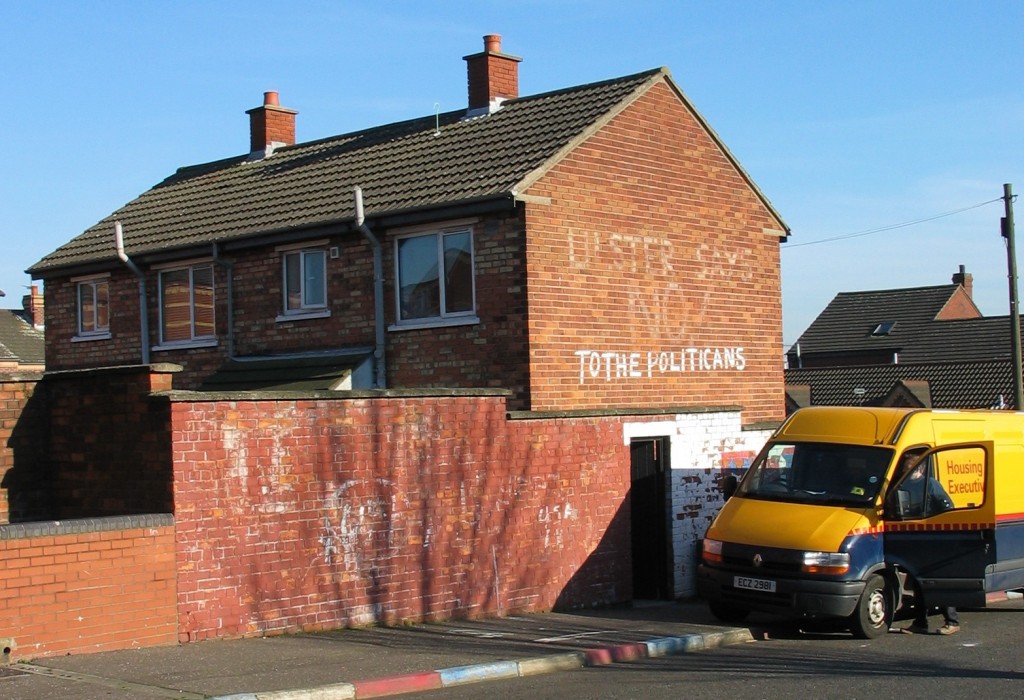
HS: No, I’m far from it. But I’m meaning I’m speaking like… Right across Europe, our national health service has fallen greatly behind. Probably we’re worse of than anywhere in the rest of the United Kingdom. But again, we’ve just been announced a budget for this year for the health. And it’s a far far greater improvement than what we’ve had from direct rule ministers. So I’m actually hoping that, because again of our own ministerial team taking over at Stormont, that they’re treating health urgently. It’s top of the priorities. Much has been. much will be done this year, but much much more needs to be done. There has to be put massive, massive amounts of finance put into our health, because we’re fallen so far behind, that it’s gonna take us years of just catching up with the rest of the United Kingdom.
JW: Ehm, you were earlier talking about education. Another thing in
education has also been the 11+ exam…
HS: Yeah
JW: Which has lately been discussed. What’s your position there. Should one keep the Northern Irish system?
HS: I.. I think personally that… this is only a personal opinion.
It’s one that splits even my own party. So you know, I don’t want to give any particularly hardline view on it. I think it’s safe to say that every avenue will have to be looked at as regards the future on the 11+. There is no point in scrapping the 11+, if we don’t have something satisfactory to replace it with. And at this given time, it’s as good an indicator as what we’re gonna have.
JW: Ok. yeah, very good. Ehm… What about drug problems and
anti-social behavior?
HS: Well, that is a big… I mean, I’m on the policely liaison committee, and drugs are a big. It’s not as bad in Belfast and Northern Ireland in general as what it would be in Dublin or what it would be in Manchester or any of the other major cities across Europe, but the alarm bells are starting to ring. It is a problem and we can’t just burry our head in the sand and think that it’s not there. It is there.
JW: hmmm
HS: And we all need to be doing as much as we can to eliminate it because we’re seeing too many young lifes destroyed and aah.. We all need the police, the community workers, the politicians, we all need to work together in harmony, to try and alliviate this horrible, horrible problem that faces all of us
JW: Yeah… Somewhat related, the BBC recently reported on a
dramatic increase in teenage suicides…
HS: Yeah
JW: …particularly in Northern Ireland.
HS: Yes, that’s become a major source… I mean, just in this road alone this past while back, we’ve had nothing but people just… people who’ve known personally who you wouldn’t have imagined and who have commited suicide. Now I think there is some of it that is related to drugs, but not all. I think it will be very wrong, I think we had a few, a few cases that were evidently related to drugs, but I mean, suicides are a big major problem. And again, the government need to, to be setting up councilors in that field and making available. If people are feeling down, there should be people they can go and speak to. A lot of work needs to be done.
It’s not for people like me. We need the experts to come in and be available, to assist the like of the Samaritans, who are a wonderful organization, who do a magnificient job. But they need to be more… to be given more finance that they can employ more concilors that go into the areas and talk and to make themselves available to people who would feel suicidal.
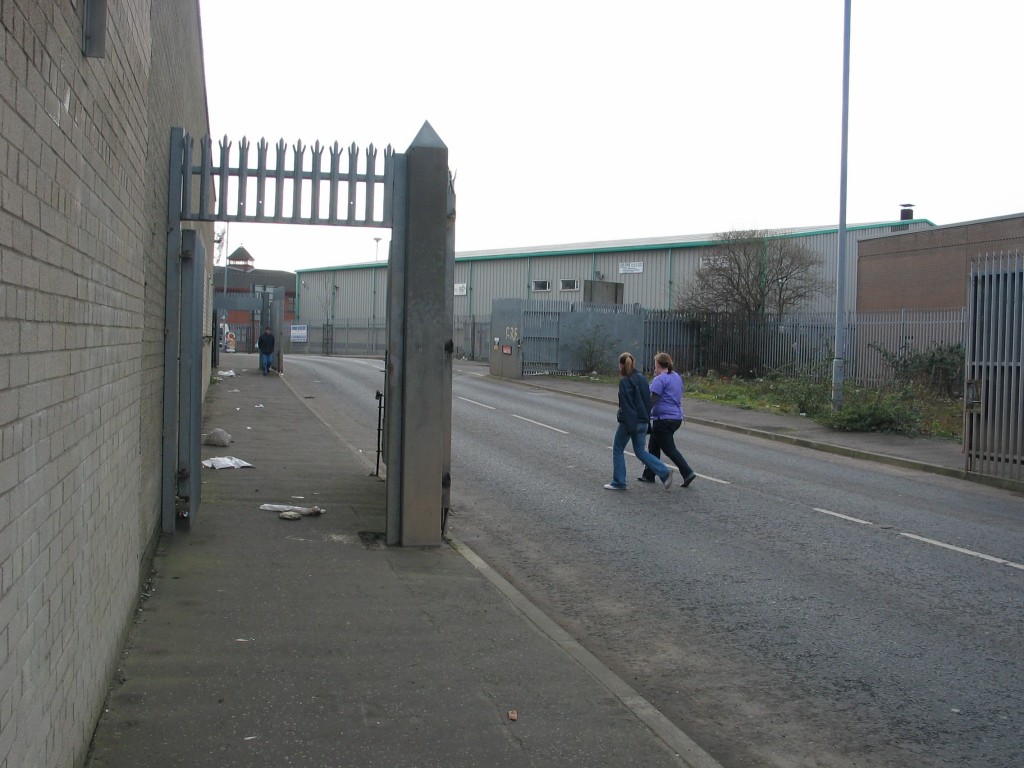
JW: Hm… Ehm, now the Shankill Mirror reports on eh.. a cut in 4.8% of the budget of the Youth Service in the draft budget of the department of education. Is…
HS: Yeah, well again, we’re apauled with that; I’m personally appalled with that. And I will be working with the Shankill Mirror to highlight this. We, I mean, these are the very services where government should be pouring money into, I mean the Youth Serv.. youth activity. When we spoke there about suicidals, and these are the very places that can help prevent suicides; can help people to keep of drugs. So it’s wrong to be cutting services that are doing a duty for the people of Northern Ireland. So, we will be fighting to get that budget increased again.
JW: Ok… eh.. Another issue has been joy riding. That is when…
HS: Yeah
JW: When young teenagers do crazy stunts in their cars and then put
videos of it on the internet.
HS: Again, I was on a police meeting yesterday, and I brought this very subject up. W-we in-in protestant West Belfast don’t have a lot of it, but w-we have noticed that over this past lot of years, it’s on the increase, and I’ve actually spoke to the police and told them that we need to have a greater police presence in all the areas, because there are certain areas where it happens, you know where there are these hills and they’re after a chase, so we’ve asked the police, and I’ve personally asked them to… to zoom in on this, and to have greater police presence, because we don’t want it to get any worse than what it already is.
JW: Yeah… You mention the police. Do you generally have
confidence that they are concerned about your area and…
HS: Yeah, I’ll.. I’ll
JW: Your issues?
HS: I think the.. My worry is that I don’t believe there is enough police men. I mean from the Patton Report the police were cut by 50% in numbers, and their su… As far as I’m concerned, there simply not just enough police men on the beat to cope. With all the areas… If you look at the whole multitude of problems that we have, you’ve drugs, you’ve joyriding, you’ve break-ins, you’ve anti-social behavior, you’ve attacks on our OAPs [Old aged pensioneers], so the police don’t, in my opinion, have sufficient men on the ground to cover and to deal with all those problems. And again I raised that yesterday, and we will continously be raising it with our MPs to see if more finance can be made available, but most important of all, to increase the number of police we have on our in our areas.
JW: Ok. Last question question: Do you feel that the working class
is sufficiently politically represented?
HS: Not really, it’s unfortunate it’s not well. It’s probably better represented now than it ever has been, I mean, if you go back thirty… over thirty years ago, when we had the like of the Unionist government in charge where they were middle class, and they didn’t particularly have any worries about working class. They knew that people had no choice but vote for them, or you voted for a catholic… they actually played the orange card here with that, but now there still not enough, but I mean at the least they’re in both parties, in the DUP and in the official unionist party and of course, my own party which is based… we are, you know working class in the Progressive Unionist Party. But others are taking a lead, and I think whilst their parties may not be directly what you would call working class, there are individual elected members within it that are trying to push the working class issues
JW: Ok, well thank you very much
HS: You’re very welcome, I hope you find it helpful
JW: Yeah
I leave his office and within a few minutes I am in the protestant Falls Road area. The answers he gave me actually satisfied me, but then again, he is a politician, and associated with the PUP is the Ulster Volunteer Force (UVF), a militia group with a long history of killing people. Does he know about all that? Is Mr. Smyth giving orders himself, or does it happen despite his advice to follow the parliamentary way and to work for less anti-social behavior and more apprenticeships?
Eat or kill — what to prefer?
This post was written almost two years ago now, in August 2006. Although the person mentioned apparently isn’t dead yet (or he wasn’t when I checked a few weeks ago), I now feel comfortable publishing it for technical reasons.
I just left Douglas, heading south, not really knowing if or when I will ever return.
My last stay in Douglas, AZ, has been a rather odd experience. For one thing, some people have read the book and reacted at least partially negative on some of my points. Specifically the fact that it is written in a Marxist framework is hard to understand for most probably.
However, even more odd is, I believe the fact that so many people have not reacted very much at all and that generally it seems as if not much has changed since I left last time.
One person stroke it rich though. Bicycle Peter (in the first edition of the book called “Bicycle Victor”) managed to receive around 82000USD in disability compensation. Those who have read the book might recall that Bicycle Peter is 77 years old and had been in the Korean War. From there he was relocated to Japan after an incident, and he met a prostitute, whom he grew to love and wanted to marry. Although that marriage never actually happened, he has since almost only been dating prostitutes across the line in Mexico.
But Peter has spent the money already. Part of it went into a new car (though no money is left for gas), some debts were paid, and the two houses of his girlfriend’s family in Chihuahua were fixed. “They are both big enough to put a small airplane in them,” Peter explains.
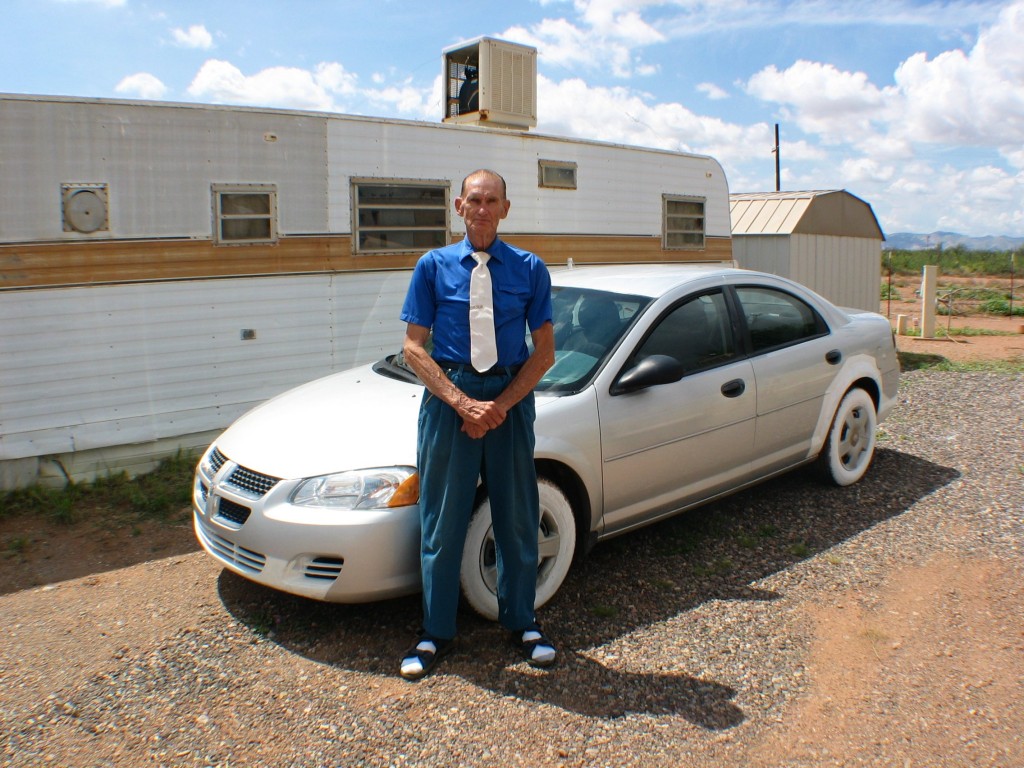
The Sandinista vs. Sandinista transport strike
Update: Today, Saturday May 17th, the strike has ended after 12 days. Transport workers will get subsidies of 1.30 USD/gallon, but cargo transport will be excluded from that offer as they are “not regulated”. Where the money for that suddenly comes from is unclear.
The Central American Republic of Nicaragua was in the 1980s portrayed as one of the greatest communist threats in the western hemisphere. Once the political right won presidential elections in 1990s, the ideological education so many had received for a decade suddenly didn’t seem to have mattered. That is until now, in May 2008 little more than a year after the Sandinistas regained the presidency with a promise of national reconciliation, when transport workers take to the streets, shut down all public transport built barricades on major highways and demand for the government to go back to politics of price control and subsidization. Now running on its 9th consecutive day with all talks between drivers and government not anywhere close to a positive the solution, the immediate future of Nicaragua is uncertain.

The strike started on May 5th. The first day only busses between major cities stopped while city busses and taxis in Managua as well as busses between minor destinations continued to operate. Since then all transportation has been shut-down with the exception of occasional pirate taxis. In the city of León drivers have set up camp at the exit of the highway to Managua, and most afternoons they block each lane for ten minutes at a time to stop most traffic, although only past Tuesday did it end up with violent confrontations between police and demonstrators.
The demand brought forth by the transport cooperatives are frozen petrol prices at the equivalent of 2.88 USD/gallon or 0.49 Euro/L for public transport, as they claim is the case for those operating in Managua already. Currently prices run around 5.18 USD/gallon or 0.88 Euro/L. The money that is to be used on this is the money that the government allegedly has access to through an oil deal with Venezuela which lets the country buy oil at market price, but with only 50% having to be paid within 90 days and the remainder in 23 years with an extremely low 2% interest rate. The government on the other hand claims that there isn’t sufficient funding available for such heavy subsidization and that part of the available funds are to be used for other projects, such as anti-hunger measures, micro-credits for small shop owners and road infrastructure measures.
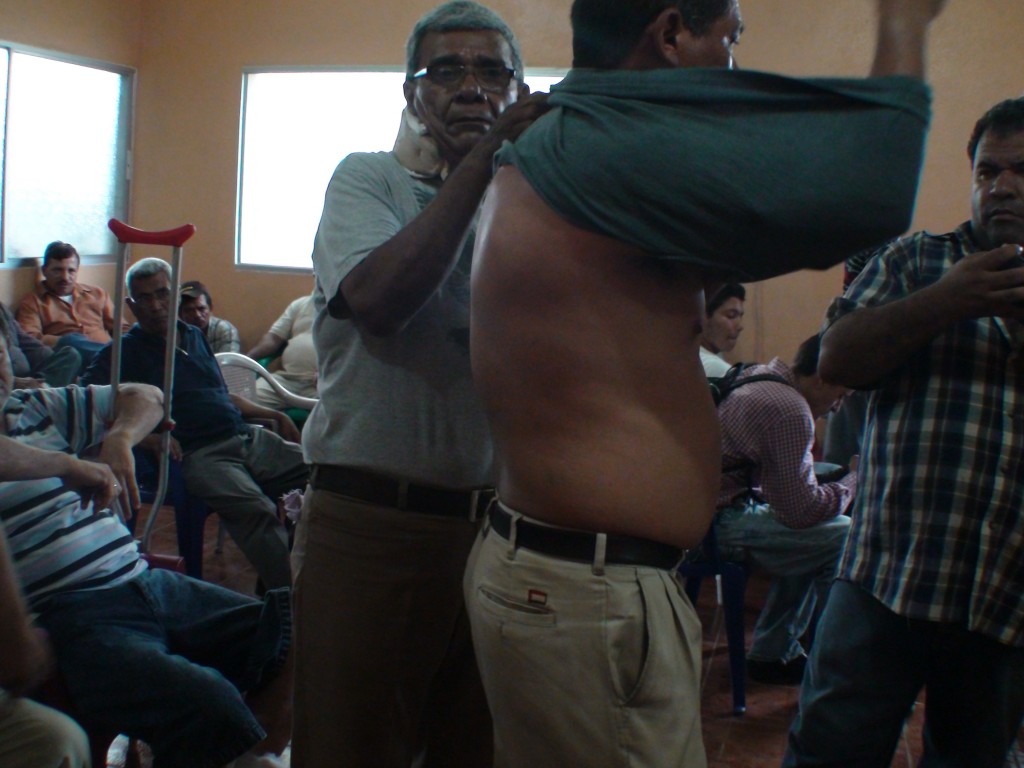
Continue reading The Sandinista vs. Sandinista transport strike
No updates — try to come back in a year!
Hey everybody. It’s not like I’m not experiencing anything. I’ve been studying in London, went to Belfast and interviewed representatives of opposing but leftist/socialist parties, I went all across the States from Portland, OR to Miami, FL, stopping by in Berkley/Oakland, CA, Douglas/Tucson, AZ and NOLA (all by land) while meeting tons of people. And I’ve started fieldwork here in Nicaragua where I meet and talk to everything from open source software students (explaining to them all about LAMP) to hardline Sandinistas involved in land occupations, backpackers of all types and intellectual elites.

I started writing a number of texts, but I just can’t get myself to finish anything to be published. Maybe I’ll do sometime in the future, but don’t count on it. I don’t really think I’m obligated to tell anyone why, but it’s just how it happens to be. If nothing else, it was getting boring having a constant deadline waiting for me just around the corner.
If you really want to know what I’m doing, it’s probably best to send me an email or contact me on Facebook (email: j.wilm (a) gold.ac.uk), and I’m sure I’ll tell you something or other, depending on who you are.
PS: If you are from Denmark/Norway (or feel close to those countries), check out the national campaign websites for these countries to get their soldiers home from Afghanistan that I’ve created recently: Norway & Denmark.
